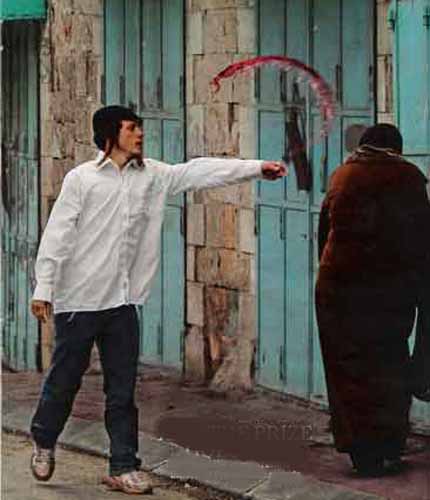Get the granny
Shlomo Dier | 23.03.2010 20:05

get the granny
On June 8, 1967 Israel attacked the US ship Liberty by air and sea. The attack killed 34 US crew members, wounded 171 and severely damaged the ship. The AIPAC forced Congress not to investigate.
In 1975 Pres. Gerald Ford said he was going to make a major speech calling for a reassessment of Israel-US relations.
The AIPAC responded to the threat by getting 76 senators to sign a harsh letter to Ford, warning him not to tamper with Israel-US relations.
Ford never made the speech and it would not be the last time that AIPAC got three quarters of the US Senate to sign a letter designed to keep an American president in check.
In a nationally televised speech on September 12, 1991 of the first President Bush, who, upon realizing that AIPAC had secured enough votes in both houses of Congress to override his veto of Israel's request for $10 billion in loan guarantees, went before the American public depicting himself as "one lonely little guy" battling a thousand lobbyists on Capitol Hill. A national poll taken immediately afterward gave the president an 85 percent approval rating which sent the lobby and its Congressional flunkies scuttling into the corner but not before AIPAC director, Tom Dine, exclaimed at that date, Sept. 12, 1991, "would live in infamy." Following the election of Yitzhak Rabin the following year and up for re-election himself, Bush relented and approved the loan guarantee request.
March 1980: President Carter was forced to apologize to Israel after U.S. UN representative Donald McHenry voted for a resolution that condemned Israel's settlement policies in the occupied territories including East Jerusalem and which called on Israel to dismantle them. McHenry had replaced Andrew Young who was pressured to resign in 1979 after an Israeli newspaper revealed that he had held a secret meeting with a PLO representative which violated a U.S. commitment to Israel and to the American Jewish community.
June 1980: After Carter requested a halt to Jewish settlements and his Secretary of State, Edmund Muskie, called the Jewish settlements an obstacle to peace, Prime Minister Menachem Begin announced plans to construct 10 new ones.
December 1981: 14 days after signing what was described as a memorandum of strategic understanding with the Reagan administration, Israel annexed the Golan Heights "which made it appear that the US either acquiesced in the move or else has absolutely no control over its own ally's actions. In both cases the United States looks bad....he has once again poked his ally, the source of all his most sophisticated weapons and one third of his budget in the eye."
August 1982: The day after Reagan requested that Ariel Sharon end the bombing of Beirut, Sharon responded by ordering bombing runs over the city at precisely 2:42 and 3:38 in the afternoon, the times coinciding with the two UN resolutions requiring Israel to withdraw from the occupied territories.
March 1991: Secretary of State James Baker complained to Congress that "Every time I have gone to Israel in connection with the peace process.., I have been met with an announcement of new settlement activity... It substantially weakens our hand in trying to bring about a peace process, and creates quite a predicament." In 1990, he had become so disgusted with Israel's intransigence on the settlements that he publicly gave out the phone number of the White House switchboard and told the Israelis, "When you're serious about peace, call us."
April 2002: After Pres. George W Bush demanded that Ariel Sharon pull Israeli forces out of Jenin, declaring "Enough is enough!," he was besieged by a 100,000 emails from supporters of Israel, Jewish and Christian and accused by Bill Safire of choosing Yasser Arafat as a friend over Sharon and by George Will, of losing his "moral clarity." Within days, a humiliated Bush was declaring Sharon "a man of peace" despite the fact that he had not withdrawn his troops from Jenin.
January 2009: Former Israeli Prime Minister Ehud Olmert publicly boasted that he had "shamed" Secretary of State Condoleezza Rice by getting President Bush to prevent her from voting for a Gaza cease-fire resolution at the last moment that she herself had worked on for several days with Arab and European diplomats at the United Nations.
Olmert bragged to an Israeli audience that he pulled Bush off a stage during a speech to take his call when he learned about the pending vote and demanded that the president intervene.
"I have no problem with what Olmert did," Abraham Foxman, national director of the Anti-Defamation League, told the Forward. "I think the mistake was to talk about it in public."
Shlomo Dier